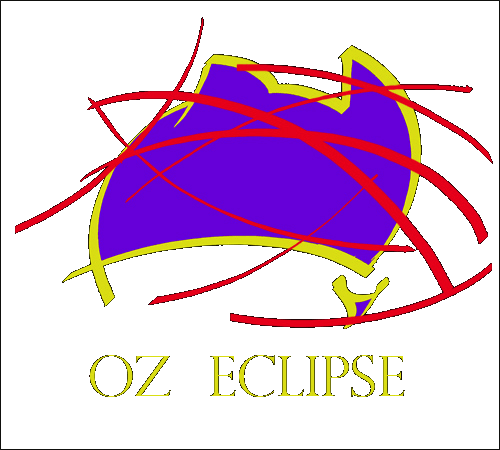|
Comet McNaught
2006 P1
I have had an interest in amateur
astronomy since 1977. Over three decades, bright comets have
been in particularly short supply. There have been a few highlights.
Comet Iras-Araki -Alcock, Halley's Comet and Comet Hyakutake.
Hale-Bopp wasn't very visible at my 35 degree south latitude.
But after thirty years, Comet McNaught was finally and by any
measure a 'great comet.'
I tried looking at it in daylight
when reports came in. Canberra had a fair bit of bushfire smoke
over the city and there was just too much glare. But when the
comet moved far enough from the Sun, I spotted it in bright twilight,
just 20 mins after sunset. What's more, the resulting photograph
was a hand held 1/60 s snapshot taken with my compact digital.
It clouded over for the next four days. On Saturday January 20th,
it was finally clear again. There was still plenty of smoke around.
I drove to a lookout on the north-west side of Canberra 6km drive
from my place.
As the sun set, I attempted to
align my equatorial mount using compass and clinometer. I wanted
to start shooting in twilight. Half an hour after sunset, the
comet became visible. I began shooting the bright head with a
500f4.5 lens during twilight. The sky was still bright so I used
the camera's light meter to determine best exposure. As darkness
descended, the tail grew and grew and grew. I marvelled at the
size and the wonderful striated structure. The bright part of
the tail stretched at least 40 degrees to the naked eye. There
was just enough time after the end of twilight to take a couple
of 5 min exposures. I set up my 80mm-200 ED f2.8 lens and took
the shot on E200 slide film. I took another shot of the setting
tail using a compact digital camera.
My long time friend, Greg Bond
& I had talked for years about waiting for the "big
one." It was here so I grabbed my mobile phone and called
him. Greg was working in Broome way up in the north-west of WA.
I was calling to give him a heads-up. Broome is 3500km west of
Canberra and so the Sun hadn't even set yet. Greg told me was
stuck under a large tropical storm and hadn't seen the sky for
days. We've been good friends for years and always give each
other a lot of grief so Greg didn't believe me when I told him
how big and bright it was. By the end of the call I think I'd
convinced him but he was still sounding dubious. I don't blame
him.
I was right on the verge of buying
a DSLR - a Pentax K10D. The comet galvanized me into action and
I went out on Sunday January 21st and bought it. The K10D has
great ergonomics. I read the manual for 10 mins, set a few parameters
and then used it in the dark that night without even using a
torch.
The rest of the week followed the
same pattern. I went out as many nights as I could. The image
I find most remarkable is the picture taken through cloud on
January 23rd.
This picture was taken through
cloud and still the tail is imaged. It is a composite of several
images and the cloud was moving yet it is a dramatic testament
to the brightness of the tail. That night, another friend, Andrew
Wilson was sitting on a verandah at a beach resort in South Australia
looking at the comet hanging over the ocean. I am frequently
critical of mobile phones and what they've done to our society
but they do have their uses. Later that night, Greg called. "THIS
THING IS HUGE!" he said. I could here the excitement in
his voice. I think he was looking at it through broken cloud.
Greg was approaching the end of a three-week shift in Broome.
But he had no equipment with him. In southeast Queensland, he
has a fantastically appointed and equipped observatory but by
the time he flew back to Brisbane, the Full Moon was interfering.
The last picture in this series
was taken on January 26th. After this several nights of cloud,
followed by a full Moon wiped out my chances of following the
fading apparition. I think it is appropriate that for such a
great comet, I didn't have to watch it fade from view. It went
out with a bang.
Joe Cali
The images below are
organized chronologically.
Click on the image to
see enlargements.
Click on the enlargement
to return here.
|





